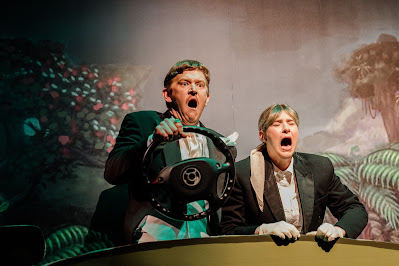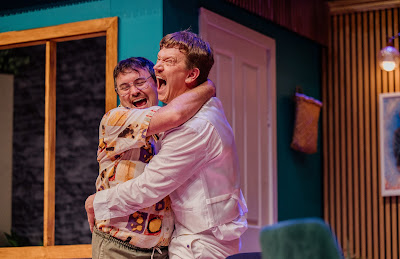Les and Fleur are a middle-aged couple at the end of their tether. Francis and Connie are newlyweds terrified of getting it on. They’ve double booked a romantic getaway at a kiwi bach in the middle of nowhere, but we’re not sure which is raging harder - the storm outside, or the hormones inside
Camping is a zany theatrical comedy set in the deceptively calm confines of a New Zealand holiday home, two couples find themselves on a collision course of hilarity and hijinks after accidentally double-booking the same bach. One couple is there for a romantic honeymoon; the other, for a long-awaited anniversary. What follows is a two-hour spectacle of irreverent humour, brilliantly absurd characters, and an unmistakably Kiwi tone that fans of dry, campy, laugh-out-loud comedy will appreciate. This is a show that revels in its camp, its quirks, and its unabashedly local references, creating a must-watch experience for audiences looking for bold, fast-paced, balls -to-the-wall humour drenched in New Zealand specificity.
The core of Camping lies in the performances delivered by its exceptional cast, each member bringing their unique flair to this comedic quartet. Chris Parker, Tom Sainsbury, Kura Forrester, and Brynley Stent embody characters who are not just larger than life but who also reflect distinct facets of the Kiwi character. This is a cast that has not just been cast well; they deliver with dedication to a level of exaggerated humour that feels precisely right for the material.
Chris Parker plays Francis, a tightly wound “mummy’s boy” with many hidden layers. Parker’s portrayal captures the peculiar charm of a character caught between nervous insecurity and repressed desire, a man so caught up in his upbringing that he borders on parody. Francis’s backstory – of having been homeschooled by his mother, only to end up in youth cadets when she couldn’t take it anymore – adds to the hilarity, making him both a sympathetic and ridiculous figure. His dry humour and suppressed quirks quickly establish him as a character audiences can’t help but root for, even as they laugh at his foibles.
Tom Sainsbury’s character, Les, on the other hand, is a simpler but equally hilarious figure. Les is head-over-heels in love with his wife, and though well-meaning, he is hilariously clueless about what she really needs. His devotion to his wife, Fleur, and his lack of emotional insight create a comedic tension that runs throughout the play, as Les’ earnestness constantly clashes with his utter obliviousness to Fleur’s true desires. Together, Parker and Sainsbury create a delightfully awkward, at times absurdly intimate portrayal of two men tiptoeing around their own latent desires and insecurities, bringing some wonderfully awkward energy to their scenes.
Kura Forrester steals the stage as Fleur, a once-glamorous pageant queen from Gisborne now caught in the throes of perimenopause. Forrester’s characterisation is a masterclass in comedic timing and audacious delivery. Fleur is a loud, unfiltered diva with an arsenal of inappropriate humour that hits with razor-sharp precision, contrasting sharply with her husband Les’ simplicity. Forrester’s skill in oscillating between vulgarity and vulnerability gives Fleur a dimension that makes her both captivating and downright hilarious. She dominates the stage with a charisma that feels almost larger than the theatre itself, transforming her into a character who is both outrageous and wonderfully relatable.
Finally, Brynley Stent as Connie Cummings plays the outsider in this high-energy group. Her character, though more subdued in her early scenes, is no less impactful. Connie’s naivety and slight social awkwardness bring a quieter, more subtle form of humour to the play. Stent’s talent shines as she skillfully allows Connie’s initially reserved nature to slowly unravel, revealing a character every bit as complex as her louder counterparts. By the end of the performance, Connie has evolved into a fan favourite, serving as a beautiful contrast to the chaotic energy surrounding her.
Camping doesn’t hold back when it comes to humour. The jokes are relentless and unapologetically Kiwi, laden with local references and character quirks that feel distinctly New Zealand. The show takes on an anything-goes approach, embracing low-brow humour, risqué innuendos, and campy tropes to their fullest extent. For fans of traditional Kiwi humour—think awkward pauses, deadpan expressions, and biting one-liners—the comedy is pitch-perfect. The dialogue is packed with fast-paced banter, each line sharper and wittier than the last. Even when a joke doesn’t quite hit its mark, the audience is barely given time to process before the next laugh-out-loud moment arrives.
Adding to the mix are two spectacular physical-comedy set-pieces in the second half that elevate Camping beyond mere dialogue-driven comedy. Without giving away the plot, there’s an absurdly executed talent show scene that veers into the realm of slapstick, and a bedroom encounter with cartoonish over-the-top choreography that brings to mind the wild antics of Team America. These scenes are nothing short of hysterical, embodying the physicality of the cast and the fearless, playful spirit of the production.
While Camping revels in its unrestrained humour, the show also subtly explores themes of self-acceptance, sexuality, and the pressures of societal expectations. What starts as a simple comedy about two couples stuck together grows into a story about the release of tension through embracing one’s true self, and the joy that comes with allowing others to do the same. The play taps into moments of suppressed expression and bottled-up desires, which gradually come to the surface in hilarious and, at times, surprisingly heartfelt ways.
Amidst the outrageous humour, Camping gives each of its four characters a moment of vulnerability, where their flaws and insecurities emerge. Francis and Les, particularly, embody the struggle of dealing with repressed feelings and rigid norms, while Fleur’s transformation from her pageant past to her present struggle with aging creates a character arc that is both touching and comically exaggerated. These quieter moments make the play more than just a comedy; they give it a human side that grounds the laughter in real, relatable emotion.
The set of Camping is cleverly minimal, evoking the simplicity of a classic Kiwi bach, while an array of props keep the scenes dynamic and engaging. The set becomes a lively stage where the cast's physicality and exaggerated expressions fill the space, creating a visual feast that enhances the humour. Watching the four characters navigate their antics amid this deceptively simple backdrop is like watching four versions of Mr Bean, each with their own quirks and comic timing. The result is an immersive, well-paced experience that invites the audience into the action, making it impossible to resist the humour on display.
The audience's reaction to Camping is a testament to the show’s success. The laughter is nearly non-stop, with the cast often pausing to allow the waves of audience reaction to settle before delivering their next line. It’s clear that Camping is a hit, resonating with audiences who find joy in its relentless irreverence and down-to-earth Kiwi references. Forrester, Sainsbury, Parker, and Stent navigate their timing brilliantly, expertly pausing or ad-libbing to keep the energy high and the laughs rolling.
Chris Parker, Tom Sainsbury, Kura Forrester, and Brynley Stent have created a masterful comedic experience that celebrates New Zealand humour at its finest. For fans of camp, exaggerated characterisation, and unabashedly dry wit, this is a show not to be missed. With its richly developed characters, rapid-fire humour, and surprisingly tender themes, Camping is more than just a comedy; it’s a love letter to Kiwi culture, delivered with all the absurdity and flair that New Zealand audiences adore. Whether you’re drawn to the bold themes, the physical comedy, or the sheer joy of seeing New Zealand’s quirkiest characters brought to life, Camping is a memorable theatrical experience that will leave you laughing long after the curtain falls.
Camping is recommended 16+
Duration: 115 minutes, including intermission
Dates: 14 November – 7 December 2024
Venue: Q Theatre, Rangatira, Auckland (Tāmaki Makaurau)
Tickets can be purchased here







